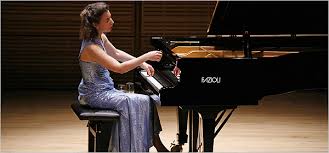Saturday 21 February 2015 – Angela Hewitt at the Assembly Rooms
The Art of Fugue is one of a small number of works which stand outside the usual canon because of their intense spiritual impact. As such they are not heard as often as one might expect and performances are all the more important. Angela Hewitt recently recorded the complete work and here gave us a peerless performance as well as a fascinating insight into the composition from the performer’s point of view.
Reminding us that this was no walk in the park she took us through the twenty sections with succinct illustrations to allow us to follow the musical narrative up to the point where Bach died before the completion of Contrapunctus XIV. While many performances end at this point she made a strong case for including Vor deinen Thron tret ich hiermit BWV668 as a conclusion to the work, as Bach was certainly editing the chorale immediately before he died and the text I stand before Your throne seems eminently fitting given the context both spiritually and emotionally.
A sold out Assembly Rooms was unusually hushed with a deep sense of concentration throughout. She brought an innocence and lightness to the opening fugues, the third being more reflective and the fifth wistful with a sense of yearning. The French style of the sixth moves us into new pastures, almost a new start before the seventh returns us to the more puritanical tones of the earlier fugues and a re-launch into pastures new with the eighth. The splendid articulation of the ninth hardly prepared us for the complexity and chromatic wanderings of the eleventh which marked a high point of emotional intensity of the cycle. By contrast the twelfth felt almost monastic in tone before the headier cantabile of the thirteenth.
The cool lines of the first canon came as something of a relief after the previous intensity with the simple clarity of the third canon being balm to the spirit. All of this prepared us for the final, fourteenth, fugue. Is there a sense of resignation here, a hint of the inevitability of death? The inclusion of B.A.C.H. woven into the fabric of the musical structure sounded like a voice from outside calling within the work itself. A magical, no mystical, moment – and nothing ever prepares one for the sudden catastrophic end.
The quiet confidence which permeates Vor deinen Thron tret ich hiermit more than justified its inclusion as a farewell to the cycle.
Angela Hewitt seemed tired at the end and it took more than a couple of recalls to the platform before she regained her sunny disposition. There are few performers who can get to the heart of Bach’s masterpiece today and we were privileged to hear it in a live performance.
Thankfully the CD is available for those who were not able to attend in person.

